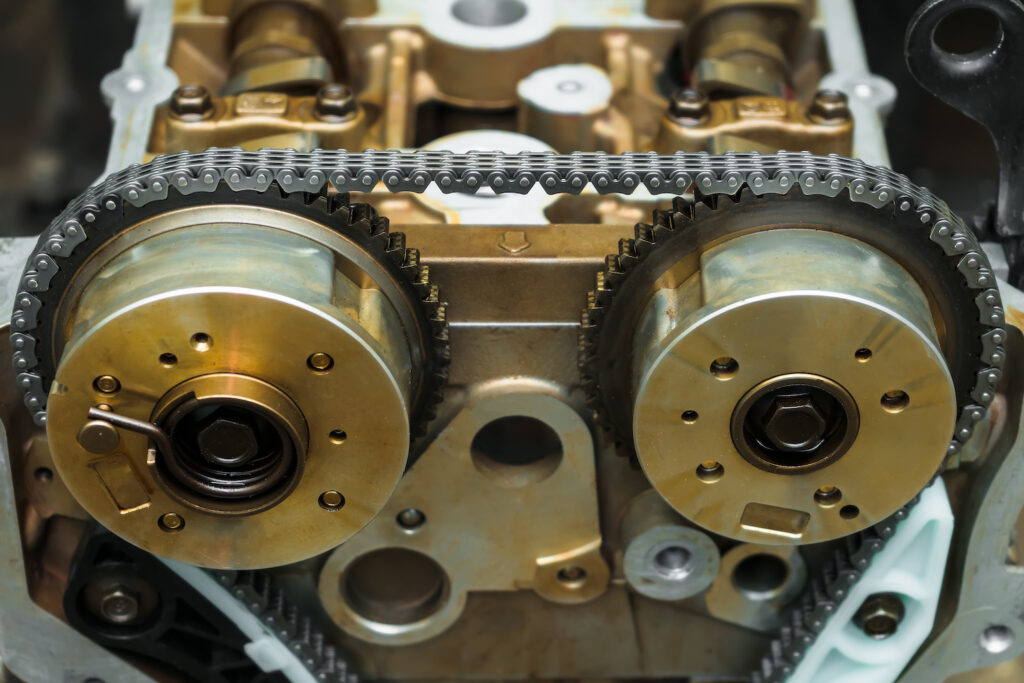If you own a European car, you’ve probably heard the term “timing chain” during a service or repair conversation. But do you know what it really does — and why ignoring it could lead to serious engine damage?
Whether you’re driving a BMW, Audi, Mercedes-Benz, or Volkswagen, the timing chain is a crucial part of your engine’s performance and longevity. While timing chains are designed to last longer than timing belts, they aren’t immune to wear. And when they fail, the consequences can be expensive — or even catastrophic.
In this blog, we’ll break down what a timing chain does, signs of a failing chain, when it should be replaced, and why European car owners in Melbourne should only trust specialist mechanics for timing chain repairs.
What Is a Timing Chain and What Does It Do?
The timing chain is a metal chain located inside your engine that connects the crankshaft and camshaft, ensuring they rotate in perfect sync. This coordination allows engine valves to open and close at the correct times during each cylinder’s intake and exhaust strokes.
In simple terms: the timing chain keeps your engine running smoothly and efficiently. If it fails, your engine’s internal components can collide, resulting in bent valves, damaged pistons, and complete engine failure.
Why Timing Chains Matter More in European Cars
European vehicles like BMW, Audi, Volkswagen, and Mercedes-Benz are engineered with precision performance in mind. Many of these brands use timing chains instead of belts for longevity. However, they also tend to use high-revving turbocharged engines that put more stress on internal parts — including the timing chain.
Some models, particularly from BMW’s N47 and N20 engine families, are known for premature timing chain wear or failure, even as early as 80,000 km.
Common makes with known timing chain concerns:
-
BMW 118d, 320d, X1, and X5 (N47 engine)
-
Audi A4, A5, and Q5 (TFSI engines)
-
Volkswagen Golf and Passat (TSI engines)
-
Mercedes-Benz C-Class and E-Class (CGI engines)
This makes routine inspections and proactive maintenance essential for long-term reliability.
Signs Your Timing Chain May Need Replacement
Timing chain problems often begin with subtle warning signs that many drivers overlook — until it’s too late. Keep an eye out for the following symptoms:
1. Rattling Noise on Cold Starts
A loose or worn chain can slap against internal components, creating a rattling or metallic ticking sound when starting the engine.
2. Check Engine Light (CEL)
A stretched chain can cause timing issues that trigger fault codes and turn on the engine warning light.
3. Loss of Power or Rough Idling
Incorrect valve timing can affect combustion, leading to poor acceleration, misfires, or a rough idle.
4. Engine Won’t Start or Cranks Unusually
In severe cases, a broken timing chain will prevent the engine from starting entirely — or result in a noisy, delayed crank.
How Long Does a Timing Chain Last?
Timing chains are marketed as “lifetime” components — but that doesn’t mean they last forever.
On average, a well-maintained timing chain can last 150,000 to 250,000 km, but issues like poor oil maintenance, short trips, or specific engine flaws can reduce that lifespan dramatically.
In certain European models, timing chains may need to be replaced as early as 100,000 km, especially if there are signs of wear.
What Happens If a Timing Chain Fails?
Timing chain failure is one of the most serious — and expensive — engine problems you can face.
If the chain breaks or skips, the camshaft and crankshaft will fall out of sync. Since most modern engines are interference engines, this means valves can crash into pistons, bending or breaking them.
Engine damage from a failed timing chain may include:
-
Bent valves
-
Cracked pistons
-
Damaged cylinder heads
-
Complete engine rebuild or replacement
The cost of inaction? Often $5,000 to $10,000+ in engine repairs.
Why Choose a European Specialist for Timing Chain Replacement?
Timing chain replacement is not a basic repair. It involves disassembling part of the engine, setting precise timing marks, and using special tools to realign components.
Here’s why you should trust an independent European car specialist near you:
Factory Training and Tools
Specialists have the correct engine timing tools, diagnostic software, and knowledge of common manufacturer-specific issues.
Experience With Known Problem Engines
If your car has a high-risk engine (like BMW’s N47), experienced mechanics will know exactly where to look and what signs to check for.
Transparent Pricing and Honest Advice
You’ll receive a detailed breakdown of costs, genuine or OEM-quality parts, and options tailored to your needs and budget — without the dealer markup.
Warranty-Safe Repairs
Most independent specialists follow logbook service procedures, meaning your warranty remains intact if applicable.
Cost of Timing Chain Replacement in Melbourne
Timing chain replacement costs vary depending on the make, model, and engine complexity. Here’s a general guide for Melbourne drivers:
| Vehicle Type | Approximate Cost |
|---|---|
| BMW 320d (N47) | $2,000 – $3,200 |
| Audi A4 TFSI | $1,800 – $2,800 |
| VW Golf TSI | $1,500 – $2,500 |
| Mercedes-Benz C200 CGI | $1,800 – $2,700 |
Keep in mind: early intervention costs less than post-failure engine repair.
How to Prevent Timing Chain Problems
Prevention is always better than a costly repair. Here’s how to keep your timing chain in good health:
✅ Use high-quality engine oil and change it on time
✅ Avoid short, frequent trips that prevent oil from warming up
✅ Listen for unusual noises on cold starts
✅ Service your car at a European specialist who inspects chain wear
Final Thoughts: Don’t Ignore Your Timing Chain
Your timing chain may be hidden beneath the surface, but it plays one of the most critical roles in your engine’s function. Especially if you drive a European diesel or petrol vehicle, staying proactive can save you thousands in future repairs.
If you notice early signs of timing chain wear — or just want peace of mind — book an inspection with a trusted independent European car mechanic near you. They’ll help you catch issues early, extend your car’s life, and keep you safely on the road.
Would you like this content formatted with internal links, schema markup, or uploaded in WordPress format? Let me know how you’d like to use it.



